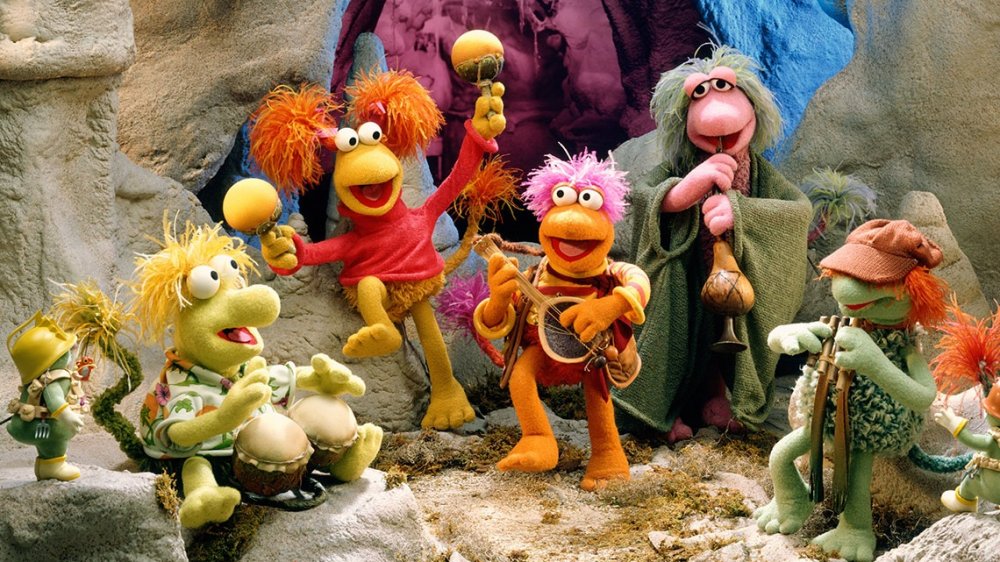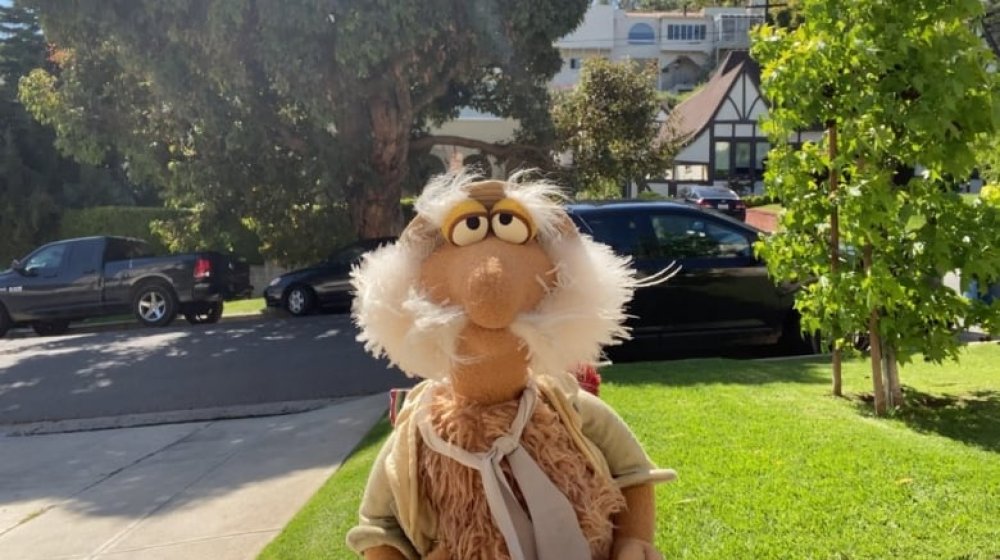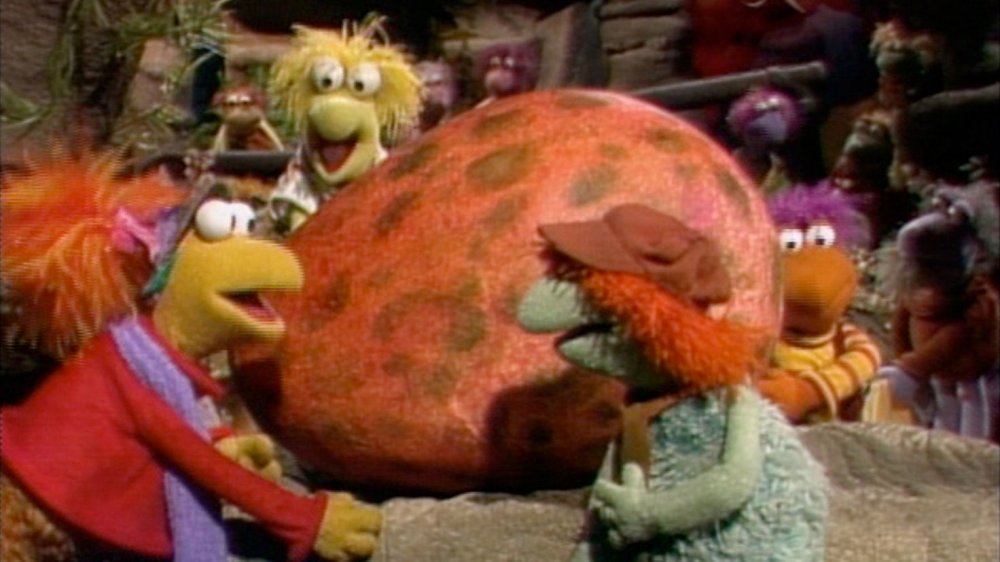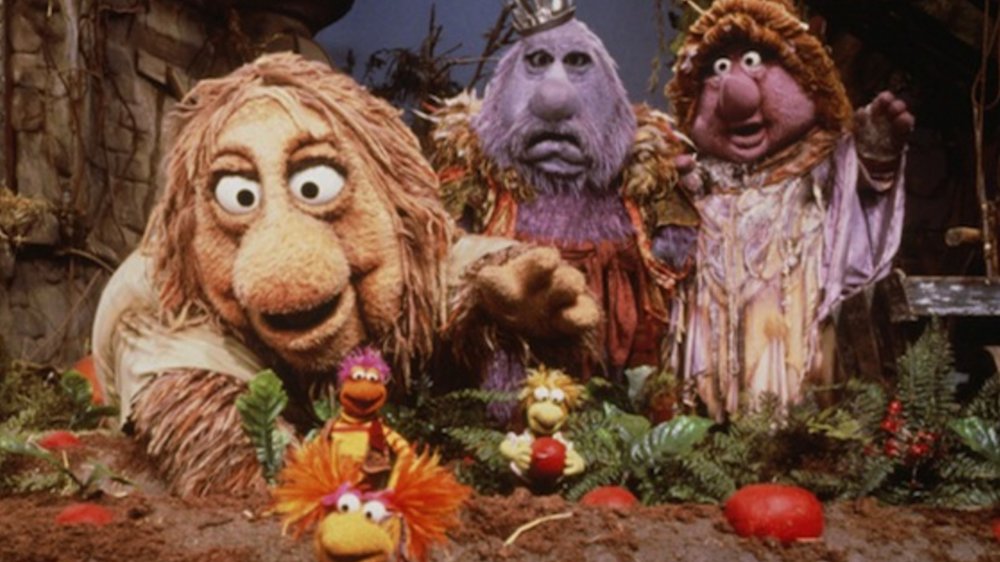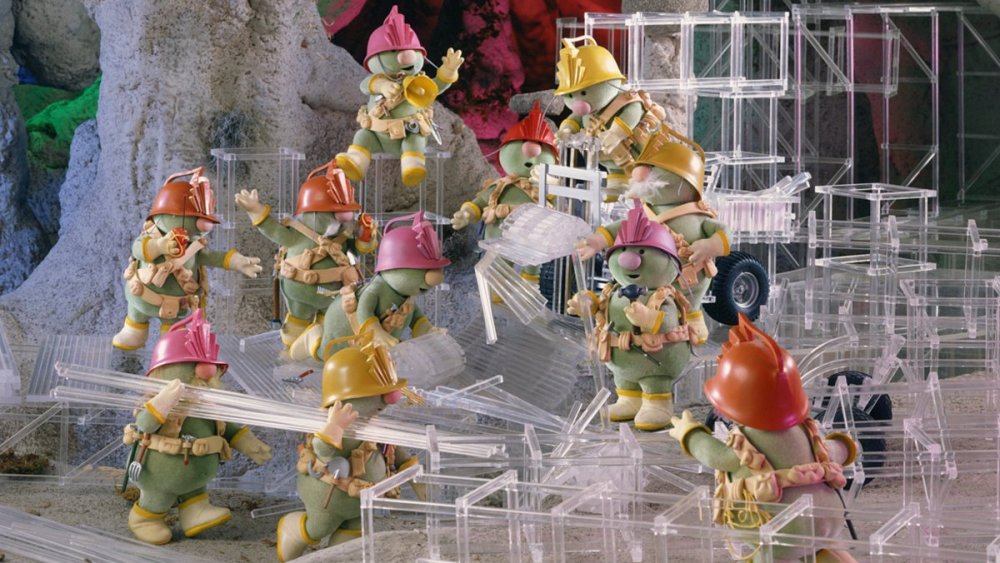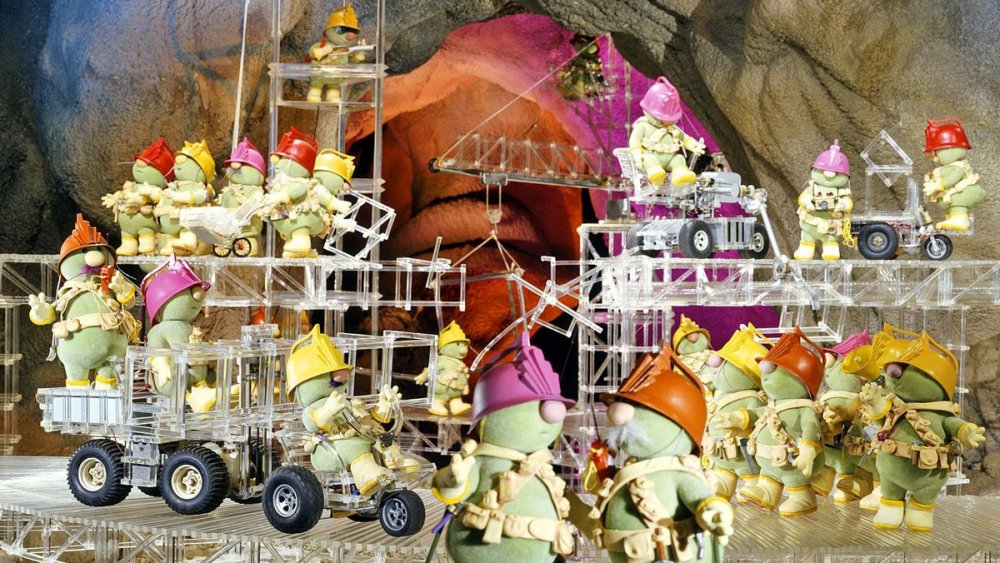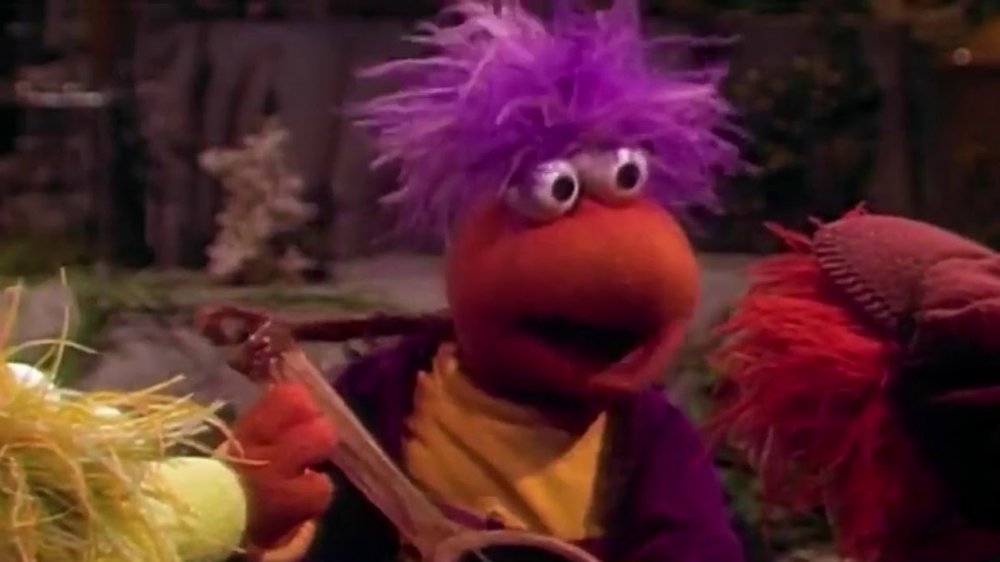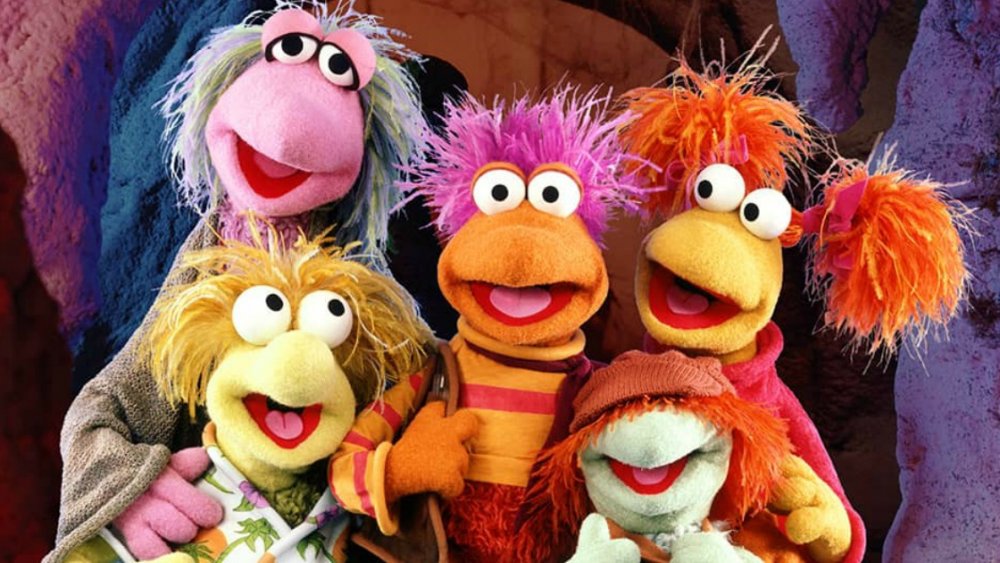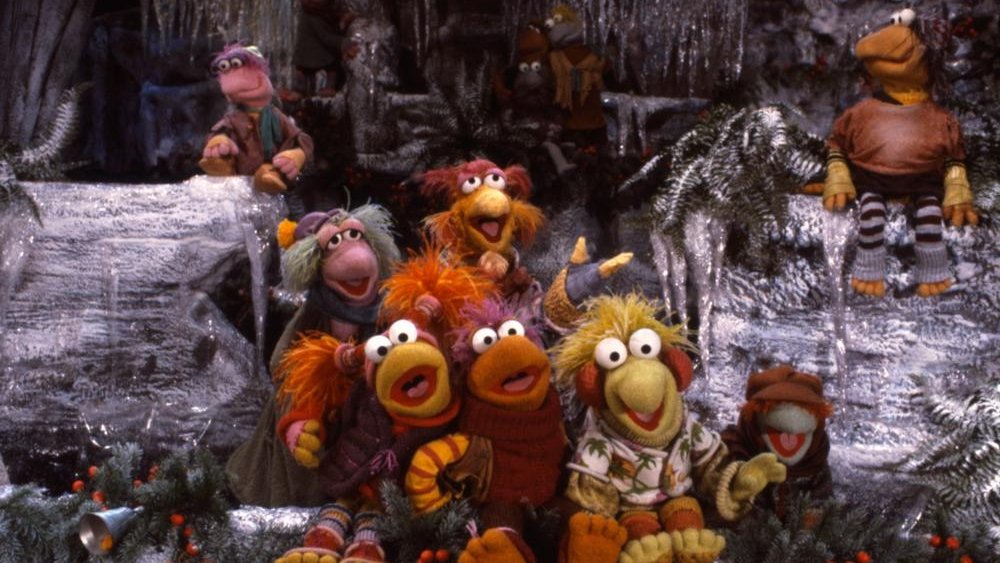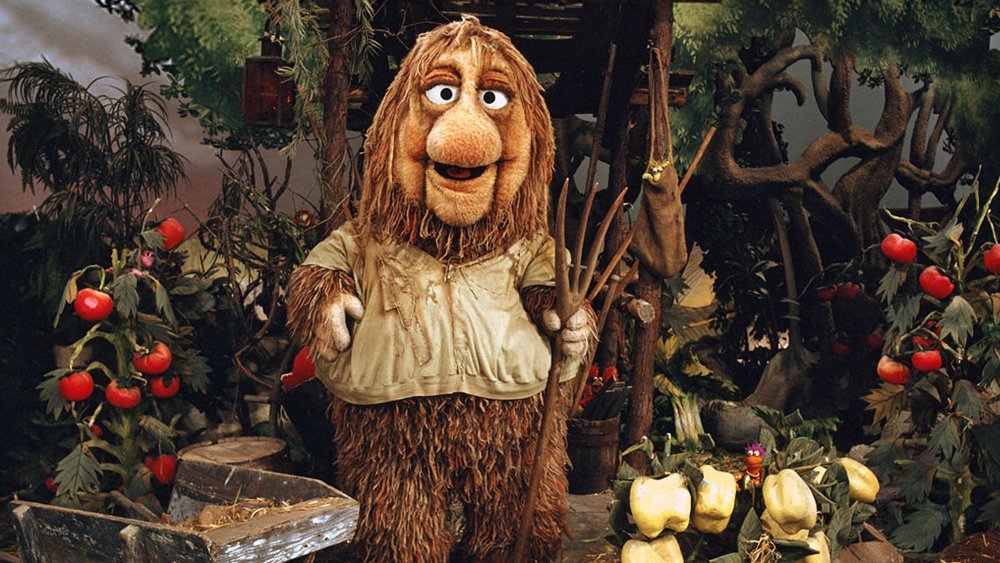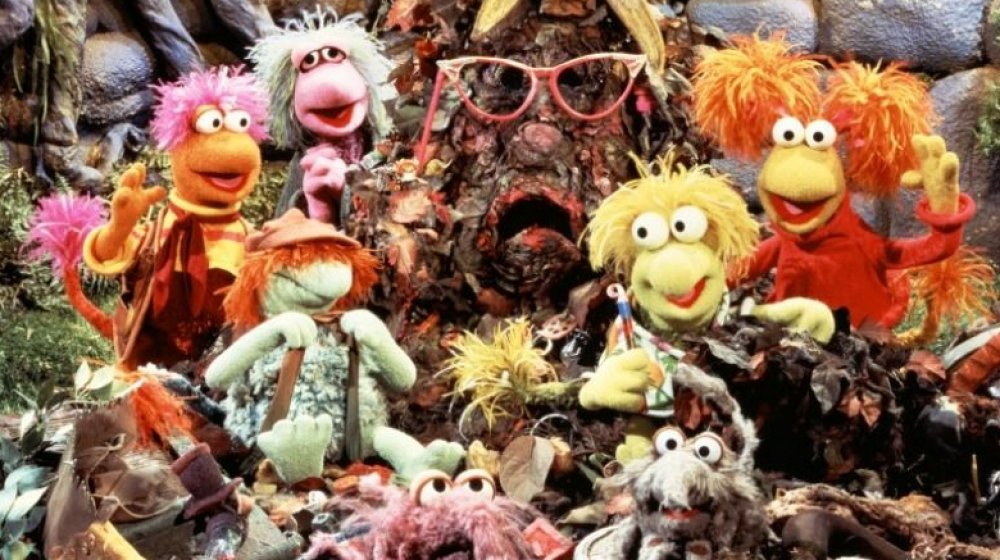Things Only Adults Notice In Fraggle Rock
Fraggle Rock is a five-season TV series from the beloved Jim Henson that ran from 1983-1988 on HBO. Like many of Henson's projects, while it is ostensibly for children, there are a lot of adult themes within it, and if you haven't ever given Fraggle Rock a try, you definitely should. The main cast of Fraggles consists of Red, Mokey, Gobo, Wembley, and Boober, although there are a lot of other characters that are introduced throughout the series. One of the best parts of Fraggle Rock is that there are important messages for children disguised as mild entertainment, so only adults really see them for what they are. For instance, Henson apparently wanted to create the show to promote world peace — something the Fraggles demonstrate across many episodes in subtle and less-than-subtle ways, but generally not in ways that are obvious to children. Through music, fun, and silliness, the Fraggles and their friends have a lot to say to viewers of all ages; with that in mind, here's a look at things only adults notice in Fraggle Rock.
Uncle Traveling Matt's adventures
One of the ways that Fraggle Rock most obviously plays to an adult audience is using Gobo's Uncle Traveling Matt's adventures. At the start of the show, Uncle Matt is sending Gobo postcards detailing his encounters in "Outer Space" — otherwise known as the real world. While a fair amount of the show focuses on the Fraggles' world, all of Uncle Matt's segments show him wandering in our world and learning things about our culture. When Fraggle Rock was airing, each country produced their own segments so that the children watching would be able to connect with the culture featured. But there's something about these segments that plays to the adult audience even more: Uncle Matt frequently misunderstands or misinterprets what he experiences in the real world, since it is so foreign to him, and while children may understand some of the mistakes Uncle Matt makes, the full breadth of his misunderstandings and what he's really showing is only really clear to adults. These segments simultaneously educate children about the world and amuse adults.
Fraggle reproduction?
Okay, yes, it's true that generally even (maybe especially?) adults don't want to think about how creatures from popular children's shows reproduce. That's fair. But the existence of Fraggle families (like Gobo having an uncle) and the fact that it is revealed over the course of the show that Fraggles lay eggs does draw the attention of adults to speculate on just how exactly new Fraggles come about. Kids may or may not be asking those questions, depending on the age of the child and their interest in that sort of thing, but many adults will end up thinking about those logistics. That's not to say that most adults are considering the specifics of those logistics (although that's possible on certain dark corners of the internet), but the fact that the show establishes that Fraggles come from eggs does start a conversation that will generally involve an adult. Don't think too hard about it, but just know that it's a topic that comes up in Fraggle Rock at least in passing.
The Gorg-Fraggle relationship
Likely due to Jim Henson's desire to encourage world peace, racism is a frequent topic on Fraggle Rock, although it isn't necessarily referred to as such. This is evident in many areas of the show, but none quite so obvious as the relationship between the Gorgs and the Fraggles. The Gorgs are a trio (Ma, Pa, and Junior) who live on a farm that is also the home of the ultra-wise Trash Heap. Underneath this farm is where the Fraggles (and Doozers) live, and there are some cave entrances that open up to the Gorg farm from Fraggle Rock. Now, Ma and Pa are pretty racist towards Fraggles and frequently try to kill them, and they've taught Junior to hate Fraggles too (with varying degrees of success). The Fraggles fear the Gorgs, but often find themselves having to risk encountering them to get to the Trash Heap or other things on the farm. Children can understand the most basic parts of the Gorg-Fraggle relationship, but it's definitely true that the implications in regards to racism are really only clear to adults. It's another case of Henson using this show to teach kids how to act while also showing them things that might be a little over their heads. Ultimately, Junior only hates the Fraggles because he's been taught to, not because the two races can't coexist, and that's something hopefully most adults can understand the dangers of.
The Doozer-Fraggle relationship
The Doozer-Fraggle relationship is a little different from the Gorg-Fraggle relationship, not in the least because it is significantly less combative. All the same, both races make assumptions about each other that can be damaging to their relationships. The Doozers are a race of tiny green people who are committed to building constantly, and the structures they build are food for the Fraggles. It's a symbiotic relationship. Sometimes, the way the interactions between Doozers and Fraggles are shown makes it seem that they are peers who support each other, but other times it's almost more like Doozers are stand-ins for the earth and even food in our world. For example, the Fraggles rely on the Doozers to eat and have to learn to treat them the right way to get what they need (more on that in a bit), which in turn is also what the Doozers need. But it's also true that the Doozers are just as intelligent and capable as the Fraggles, sometimes more. The interactions that the Doozers and Fraggles have can be complicated in a variety of ways that might not make sense to children, but can definitely resonate with adults, both in terms of how we see our place on the earth and how we see our interactions with others.
The importance of understanding, not assuming, what others need
In season 1, episode 6, the Fraggle Mokey decides that it is cruel to the Doozers to eat all of the stuff they build and she begins a campaign to stop the Fraggles from eating those structures. However, it becomes clear over the course of the episode that the Doozers actually need the Fraggles to eat those structures — they must keep building, and if there isn't any room to build more structures, they have to move on to another place where there is room. It's an interesting example of how it isn't right to assume what someone else (or another group) needs, but actually better to ask them directly and work together toward that goal. The Doozers are a group that is absolutely dedicated to working all the time (in contrast with the Fraggles' dedication to playing all the time), and by not asking them what they need, Mokey unintentionally hurts them. There's a good lesson for children here, definitely, but the nuances of the story will really only be obvious to an adult viewer.
'Catch the Tail by the Tiger'
"Catch the Tail by the Tiger" is a song heard in Fraggle Rock's 11th episode — and, like a fair number of Fraggle Rock songs, the lyrics are pretty great... but not all that relatable from the point of view of a child. Which leaves us to assume that, like a lot of other parts of Fraggle Rock, sometimes even the music is geared toward educating and entertaining children while also entertaining adults. Some sample lyrics: "No one knows where we're going / No one knows where we've been / Strangers follow us / Dangers fall on us / Life plays tricks and they're mean / Only one thing can save us / Only one thing will do / Stand up nice and straight / Don't capitulate / Courage lives and it's you."
They use mostly simple words that a kid could understand (capitulate might be a challenge, to be fair), the point of the song is fairly accessible for children, and the melody is fun as well. But at the same time, it's not all that difficult to imagine those lyrics set against a different melody as sung by Matt Berninger of the National, leading adults to think about deeper themes than just being brave. It's songs like this within Fraggle Rock that might be fun for kids, but are really only appreciated by adults.
Death in Fraggle Rock
Just as reproduction does come up (at least in passing) on Fraggle Rock, so too does death. In season 1, episode 22, Mokey is assumed to be dead after the other Fraggles mistake a doll for her at the Gorg farm. The Fraggles have a funeral for Mokey, but good news! She's not actually dead.
One of the more intense examples of the show addressing death is in season 4, episode 7, when Wembley meets Mudwell the Mud Bunny. They become fast friends, but after a bit, Wembley witnesses his friend returning to the clay and dying. In the course of the episode, Wembley even goes through many of the stages of grief. The Mokey funeral story is nothing compared to how dark the death of Mudwell is, and while death is an unavoidable part of life even for kids to know about, it's pretty intense to think that these stories are meant for children. Because of the nature and tone of these stories, adults are really more capable of fully appreciating them. After all, what may seem too serious or intense for a children's show can actually be a take on death that adults will appreciate for not being quite as serious as death in media aimed at adults.
Crisis of faith
Some kids' shows don't mention religion or faith at all, and others might mention it more than necessary. But in Fraggle Rock, while generally religion and faith aren't a big topic, the show does include one story about a character's crisis of faith. In season 3, episode 1, Gobo has a crisis of faith during the Fraggles' annual solstice holiday. Clearly meant to be a holiday episode of the show (and originally aired in time for Christmas), the show sees the human character Doc and his dog Sprocket (who the Fraggles see frequently due to the fact that the entrance to Fraggle Rock is on Doc's property) also investigate holiday traditions throughout the world. But the centerpiece of the show is Gobo's feelings about the annual holiday that the Fraggles use to make sure the Rock keeps moving as it slows down in the winter. Faith is generally not something kids think a lot about — many tend to believe what their parents believe and don't question it until they're older. So this is definitely an episode and a topic that is geared more toward older audiences, although it can't hurt to teach kids to be tolerant of other beliefs and to think for yourself, whatever you believe.
Abolish the monarchy
Toward the end of the series, in season 4, episode 25, Junior the Gorg, ends up abolishing the Gorg monarchy. Gorgs are long-living creatures — Ma and Pa have apparently been married upwards of 500 years — and while it's unclear whether the monarchy actually oversees anything or if it's just a creation of this individual family on this farm, but either way, it's definitely been a tradition for a while.
Junior is told that when the Nirvana Tree loses all its leaves, he will become king. He gets pretty freaked out by this, and when there's only one leaf left, he eats it, which causes him to shrink. Eventually, on the advice of the Trash Heap, he ends up in Fraggle Rock and learns a great deal about the world beyond his farm and the interconnectedness of the Doozers, Fraggles, and Gorgs. When he returns to his home and to normal, he accepts his crown, but then not only abdicates immediately, he also abolishes the monarchy. This is a pretty complex subject (although, granted, not as complex as death!), especially for kids. It's remarkable that it's something Fraggle Rock would even tackle, but it's interesting to think about from an adult perspective. Once again, this show is pushing for kids to be independent thinkers and to question authority, which dovetails neatly with Henson's world peace goals.
Fraggle Rock is where the heart is
In the final, extremely touching, episode of the series' original run, Doc and Sprocket are leaving their home and while they've befriended the Fraggles, it's time for them to say goodbye. The Fraggles are heartbroken and spend a fair amount of the episode thinking about the importance of friendship. The Trash Heap tells them "you cannot leave the magic" and then they find a new tunnel within Fraggle Rock that leads them to the new home of Doc and Sprocket.
It's a joyous reunion and a very sweet ending to a sweet show. And while children may believe in the magic (and may even spend some time looking for their own door into Fraggle Rock), this episode has a slightly different message for adults: you cannot leave the magic, even if you grow up. Fraggle Rock will always be there. It's a lovely message with a lot of heart, just like the rest of the show, and it ends the series on just the right note — in a way that is considerate to its viewers of all ages.
